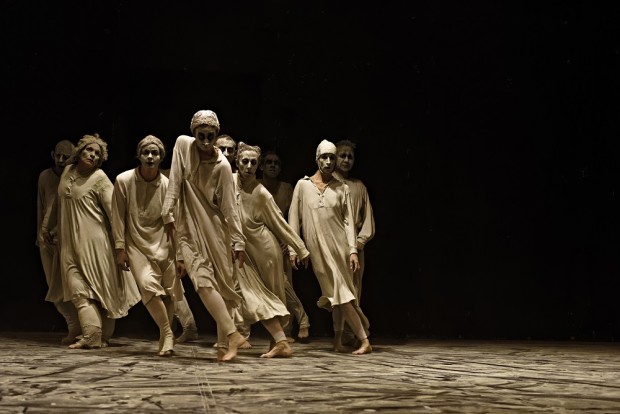Ten spectral figures, white-faced, in white night-clothes come slowly onto the stage. They stand stock-still and silent in the dim half-light. Minutes pass. Schubert’s plaintive Deer Leiermann from the Winterreise song circle accompanies their numb vigil. A shrill whistle-blast signals slow shuffling. Another, more urgent, commands greater synchronized movement. The figures draw into a circle and grunt in unison. A tighter circle, more grunting. Walking mechanically to and fro in step, panting as one. Walking, panting and grunting rhythmically as one.
Suddenly as one they face the audience. The one staring at the other in powerful symbiosis. “Fini, c’est fini,” they chant. “Ça va finir. Ça va peut-être finir”. In Beckett’s world everyone is on the same journey. Destination the end.
The Irish premiere of May B by Maguy Marin Dance Company marks the official opening of the fourth Happy Days Enniskillen International Samuel Beckett Festival – a gesture no doubt to the sister Beckett festival set to open in Paris in March 2016. Marin’s May B (a pun on Beckett’s much-loved word perhaps) is a striking illustration of the adaptability and universalism of Beckett’s language, his symbols and gestures.
You don’t have to be a Beckettphile to get the jarring contrasts between the mutual dependence and the essential loneliness of the human condition. To the cacophonous martial and carnival-esque music of fifteenth century composer Gilles Binchois the ten actors march and frolic in near perfect step. There’s touching humour in the coy sexual awakening as the men and women explore their own and each other’s wobbly bits. Lewd, carnal dancing follows as sure as night follows day.
Marin’s May B falls in the cracks between theatre and dance. The rolling and tumbling, the huffing and puffing, the endless coming and going without apparent aim, the crawling on all fours and the listlessness – all superbly choreographed – capture Beckett’s observations on life’s absurdities. At its most febrile the actor’s grunting is ambiguous, representing laughter or weeping.
Tragedy or comedy? Marin’s Beckett-inspired May B is both, though like Beckett, the lines are often blurred.
Often with Beckett’s there’s a sense of the watcher watched as his characters stare out at the audience. The sheer intimacy and sometimes harrowing nature of broken characters like Mouth in Not I, the prematurely aged woman in Rockaby and the old man lying on his back in the dark in Company make voyeurs of the observer.
The synchronized masturbation scene in May B also has this effect, though is a reminder at the same time of the perversely comic touch that lines so much of Beckett’s writing.
Schubert’s Tragic and Death of a Maiden form the sympathetic soundtrack to a sequence of scenes where impotency and frenzy, hilarity and drollness are juxtaposed. Beckett characters appear: Hamm in his wheelchair; Lucky at the end of Pozzo’s rope; the three women sat stage front babbling incoherently are evocative of the mad Mouth’s multiple voices. Blindness, paralysis, servitude, insanity – to each and everyone their speciality.
A birthday cake complete with candles brings out the best and worst in the characters; silent harmony and complete discord. Lucky of course gets none. By this point it could be all be a little confusing for those not overly familiar with Beckett’s works but as the supine character in Company declares, “Confusion too is company, up to a point.”
In an extended passage the actors – dressed in anonymous civvies and carrying vintage suitcases and bundles – shuffle on and off the stage in metronomic rhythm. “Jesus’ Blood Never Failed Me Yet” – Gavin Bryars’ orchestral recording of an anonymous homeless man singing to himself on a London street in 1971 – forms a moving, eighteen-minute loop to the curiously hypnotic, repetitive cycle of comings and goings.
A woman finds herself alone and calls out repeatedly but her companions have all gone. Another group arrives and with tenderness and balletic/clownish grace help each down other off the stage with poignant finality.
In the end silence falls and there is just one man alone and motionless with his suitcase. “Fini, c’est fini,” he intones. “Ça va finir. Ça va peut-être finir.” The stage lights die slowly to the operatic strains of Schubert’s Der Doppelganger.
Marin’s spellbinding May B, like Beckett’s work, is full of our own doppelgangers: lost souls drawn to each other; coupled; manacled together; dancing, loving and fighting; laughing, raving and crying.
Clinging to each other and shuffling along amidst the confusion and uncertainty. Not without humour and tenderness, but in the end alone. Ian Patterson





